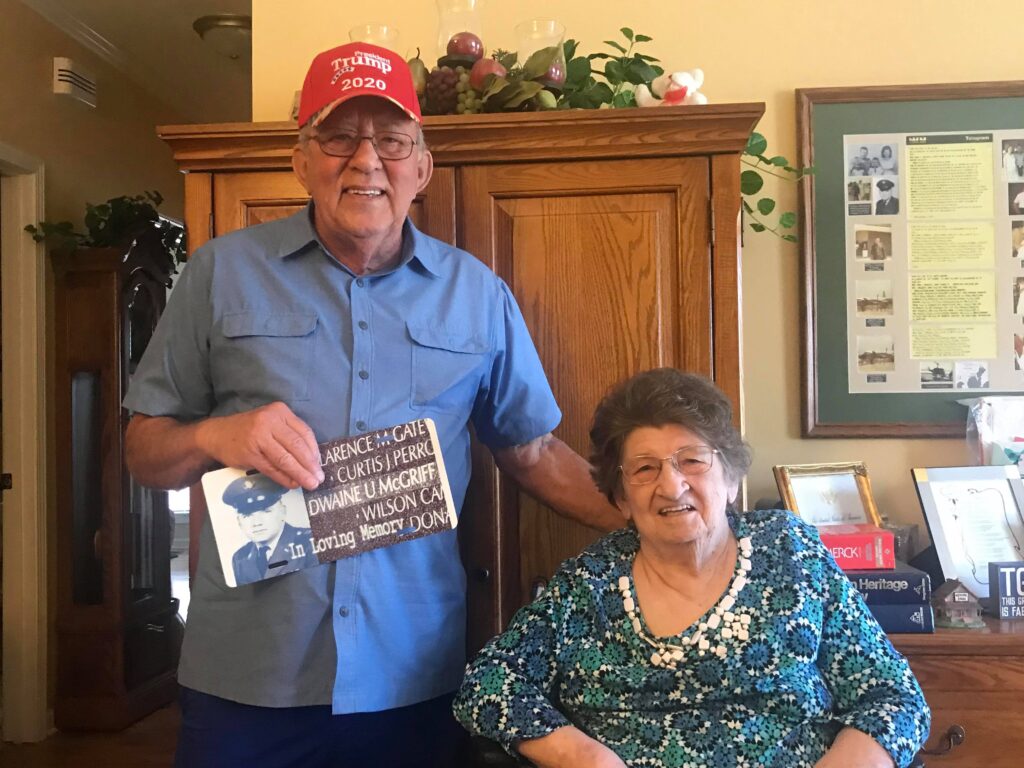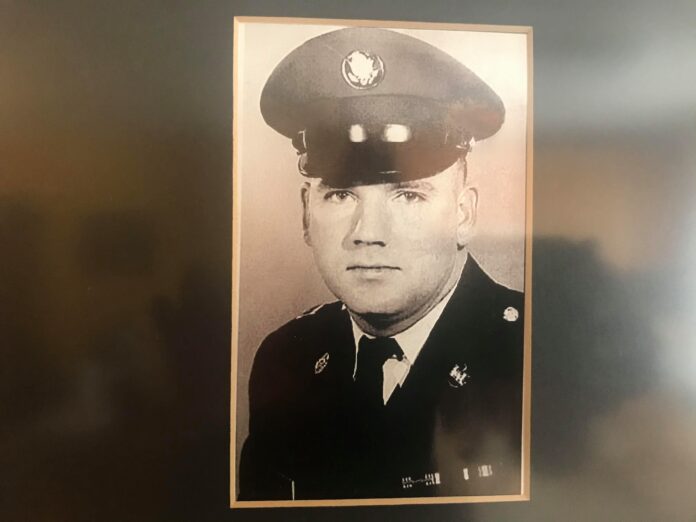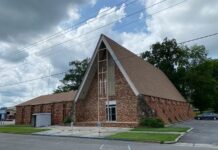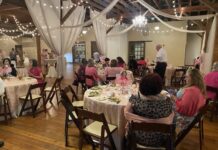Dwaine McGriff and David Golden were just young boys when they became friends. Both sons of Cullman County sharecroppers and students at East Point school, they longed for a life away from picking cotton. The United States military would give each a ticket out of the cotton fields and put them on different paths that would once again merge years later and continue today.
“He was my best buddy, old Dwaine was,” Golden smiled.
The boys grew up in the Gold Ridge community and met when they were around 10 years old.
Said Golden, “We went to East Point together and his folks were like mine; they were sharecroppers. I went into the Air Force to get off of that cotton farm. I didn’t like picking cotton.”
McGriff’s widow, Anna McGriff explained, “He (Dwaine) went up to Michigan to get away from picking cotton to work in the car factories but ended up working in a garage in the nighttime. He joined the Army from there.”
Golden recalled seeing soldiers coming home from World War II when he was around 6 years old. He was so impressed with what he saw.
“My uncles and cousins would come home and they were just young guys, 18 or 19 years old,” he remembered, “and they would have those uniforms on and those bloused boots, and boy, they looked so good. They’d be spending money like drunken sailors, and I thought they made a lot of money.”
Those images would lead to Golden longing to join the military when he was finally old enough to enlist.
The day Golden turned 17, he was working for Dr. Farr, the veterinarian in East Point. He asked his boss if he could go take care of some important business. He said Dr. Farr replied, “You ain’t got no business. You ain’t old enough to have no business.” Golden was given permission to leave work and he headed to the courthouse. He wanted to be a paratrooper.
“I was looking for an Army recruiter, and an Air Force guy stuck his head out,” he said. Golden was shown some pictures of “pretty gals in Hawaii” and he signed up.
He needed his parents to sign the papers, though. His parents weren’t going to sign them. Golden said his father said, “You are too young to go into the military now.”
Golden told his dad, “I can go in next year without your signature.”
He said he continued to ask his parents every single morning to sign the papers. One day, Golden’s 13-year-old sister said to her brother, “Give me those papers! I’ll sign those papers. I’m tired of hearing about you wanting to go in the Air Force.” She signed the papers, and according to Golden, away he went in 1954.
McGriff wanted to go into the Army at 17, but his parents didn’t want to sign his papers either.
Anna McGriff said, “Dwaine went in August of 1953.”
The two friends signed up on the same day exactly one year apart, but they didn’t know it.
Years later, McGriff was on his second tour in Vietnam Sept. 7, 1970 when he was wounded.
“He was in a Rome plow and he was knocking down mahogany trees in the jungle and underneath the jungle was a Viet Cong operation. When they were finished knocking down the trees and they were getting ready to go home, they would come up out of the ground and they got him and took off his left leg and his stomach,” said Anna McGriff.
“It’s a miracle that he lived,” she continued. “I asked him one time. I said, ‘Mac, what did you think when you got hit?’ This thing, an RPG, burnt through the bed of that truck and Mac told me that he was in the back of it doing paperwork. He said it hit him in the back of the hip and it was supposed to explode, but it hit him and then rolled over into the bed and blew up. I said, ‘What did you do Mac?’ and he said, ‘I tried to get up, but I looked down and my leg was missing. I started yelling medic, medic, medic!’”
Help arrived and he was able to make it out of the jungle when a general in the area stayed behind to give McGriff a spot on the helicopter. This act of bravery saved McGriff’s life. He was taken to the nearest field hospital where he stayed for a week. He was then sent to the 249th General Hospital in Japan for two months. His head nurse traveled with him as he was flown to Walter Reed Hospital back in the United States.
McGriff’s injuries were extensive. He spent 32 months in intensive care at Walter Reed and four to five years total before returning to Cullman. Seven days after McGriff was wounded, his mother died. When he returned to the states, his wife was instructed not to tell him about his mom’s passing. When he would ask for his mom, Anna McGriff said she would tell him, “She is fine where she’s at.” He never questioned it.
Anna McGriff was battling a tumor behind her eye during this time, and the doctors felt the pressure was too great on her and that her husband was doing well enough to know. She said when she told him his mom had passed, he said, “I knew it! I had a feeling.” A doctor was on stand-by with a shot in case he needed to be calmed. McGriff said, “I don’t need to calm down. My mother wanted to be with my father. I wanted to live to be with my wife and kids, so the Lord answered both of our prayers.”
Golden recalled McGriff’s determination when he told the story of the day he left the hospital.
He said McGriff told him, “I was being rolled out of the front door of the hospital in a wheelchair and I said, ‘Sarge, hand me my walking stick. I said when I came in here, however long it was, one of these days I’m going to get up and walk out of here. I grabbed my crutches and walked out the front door.”
McGriff lost his left leg from the hip down. His stomach was “blown out.”
“They put a 13-inch by 10-inch mesh in his stomach because everything was falling down, so they had to put that where the muscles were blown out,” his wife remembers.
McGriff told both his wife and Golden that if he had to do it over again, he would. They both said he never complained one time about being in pain.
Anna McGriff added, “The only way I knew he was in pain- he would pull a sheet up over his face- that’s how I knew he was in pain.”
“He was tough, old Mac was,” Golden said.
Golden wouldn’t know what was going on with his childhood friend until a chance encounter at Wallace State in 1975.
Anna McGriff said, “We were in bookkeeping class and David came over to me and he said, ‘Are you a McGriff?’ I said, ‘Yeah, through marriage.’ He said, ‘I had a buddy and I can’t find him and nobody knows where he is. We used to hang around when we were in school and we double dated. He went in the Army and I went in the Air Force.’ I said, ‘Is his name Dwaine?’ He said, ‘Yeah.’ I said, ‘He’s in another class over there.’ He said, ‘Where are you from?’ I said, ‘Massachusetts.’ He said, ‘My wife’s from there, too.’”
Golden’s wife Pat and Anna McGriff grew up in Massachusetts about 40 miles away from each other.
Said Golden, “Anna was raised in the city and my wife was raised on a dairy farm- a country girl. I told Anna who I was that day at Wallace, and when she told me where he was, I just got up and took off right then.”
The couples became close friends and lived in the Fairview area. Their children went to school together and they became like family.
Golden said, “Me and old Mac were blessed. Both of us got a good wife- a couple of Yankee gals. I used to tell Pat, ‘Now if you leave, if we get a divorce, you can’t stay here in Alabama. You’ll have to go back to Massachusetts. You have to have a sponsor, if you are a Yankee, to live in Alabama.’”
McGriff was in and out of Walter Reed Hospital regularly, and his wife endured her own health issues. She has battled cancer three times, as well as a serious back surgery leaving screws in her spine. The Goldens were a great support system for the McGriffs, and David Golden even traveled to see his friend during one of his many stays at Walter Reed. In the last three years of McGriff’s life, he went 15 times by helicopter.
Golden recalled visiting his friend, saying, “I visited with him a while and I was fixin’ to leave and I told the doctor, ‘Hey doc, you gotta get my fishing buddy well here. We’re old-time friends and you gotta get him back well so he can go home so we can go fishing! Old Mac, he smiled a little bit. The nurse told me after, ‘That’s the first time I’ve seen him smile since he’s been up here.’ He had been there for a couple of months that time.”
Prior to his death Jan. 7, 1999, McGriff told his wife, “Always stay close to Pat and David. They’ll take care of you.”
The Goldens now live two doors down from Anna McGriff, and Golden continues to make sure she is OK each day. A month after McGriff died, Anna had surgery on her shoulder. She’s had surgery on her neck and back as well as a mastectomy. The Goldens have been there with her through it all.
Golden said, “I’ve had a good life. I’d change one or two things if I had to do it over.”
Anna McGriff asked, “What would you change?”
He replied, “I’d try to be a better witness for the Lord. I don’t know about the other, oh yeah! I probably wouldn’t drink as much as I did.”
“You drank?” she asked.
As the two continued to chat back and forth, Anna McGriff and Golden laughed and teased much like a brother and sister would.
McGriff’s name was added to the Vietnam Memorial in Washington D.C.
Said his wife, “He died from his wounds (he got) over there, but he didn’t die in Vietnam so he can’t be put on the Cullman wall up at Sportsman Lake because he died in the United States instead of Vietnam. His name is on the Vietnam Wall up in Washington, 7W/51.”
Copyright 2020 Humble Roots, LLC. All Rights Reserved.

































